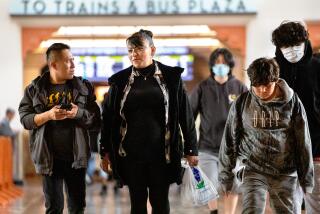Smallpox Vaccine Recommended for Emergency Teams Only
- Share via
WASHINGTON — A panel of U.S. health experts on Thursday recommended smallpox vaccinations for the roughly 20,000 health-care workers who would be the first to respond to a deadly bioterrorist attack but stopped far short of making the vaccine available to all Americans.
The step, if accepted by Health and Human Services Secretary Tommy G. Thompson, would mark the first time in three decades that anyone outside a tiny number of scientists and laboratory workers would have access to the vaccine.
Thompson said in a statement Thursday that, while the threat of a smallpox attack is believed to be low, “unfortunately we now live in a world where we need to be prepared for the possibility of such a biological attack.”
He said he would move “as expeditiously as possible” to set a new policy, which might also be reviewed by the White House.
The federal government stopped routinely vaccinating against the disfiguring and highly lethal disease in 1972--23 years after the last case on U.S. soil. By 1978, smallpox had been eradicated worldwide, and now the only known samples of the virus are held by government officials in the U.S. and Russia.
For years, terrorism experts have expressed concern about the security of samples held by the Russians, saying they cannot rule out the possibility the virus could fall into the hands of individuals who would use it in a bioterrorist attack. Without widespread immunizations, such an attack could be devastating, experts have warned.
In light of the perceived threat, top federal health officials moved aggressively last fall to acquire enough vaccine for each American by the end of this year. Thursday’s recommendation on how to use the new stockpile came at the close of a two-day meeting in Atlanta of the 15-member Advisory Committee on Immunization Practices, which sets vaccine policy for the nation. In a series of discussions, doctors, scientists and other health-care experts weighed the dangers of administering the vaccine against the chance of an outbreak.
In a unanimous vote, ACIP members concluded the vaccine should be available on a voluntary basis for an estimated 10,000 to 20,000 people who make up bioterrorism response teams assigned to handle any suspected smallpox cases. It is the narrowest population under consideration.
Under the federal bioterrorism response plan, each state is required to have at least one such team, with more to be created depending on need.
Those who would be eligible to get the vaccine fall into two groups: public health officials who would have to investigate any suspected cases and organize quarantines and vaccinations, and hospital workers at locations designated to handle an outbreak.
Officials said that working out how to implement the recommendation, if it becomes policy, would likely take until the fall at the earliest.
In recent weeks, federal health officials engaged the public in the debate over vaccination policy, which moved to the forefront of concerns after Sept. 11 and the subsequent anthrax attacks that killed five people and sickened at least 13 others.
Some experts have expressed concern that the strategy of quarantines and vaccinations that succeeded in eradicating the disease in the last century might not be effective against a modern-day bioterrorist attack. But the advisory panel expressed confidence in the strategy as they recommended that only a relatively small group of “emergency responders” be vaccinated.
Dr. John Modlin, the committee chairman and a Dartmouth Medical School professor, said the recommendation “appropriately balances” the risks of the vaccine against the likelihood of a smallpox outbreak.
The smallpox vaccine is a live form of the virus known as vaccinia, and it requires informed consent from anyone who takes it. It remains more dangerous than routine vaccinations, cautioned Dr. Julie Gerberding, the acting deputy director of the Centers for Disease Control and Prevention.
In addition, it is possible for those who are freshly vaccinated to transmit vaccinia to others.
Experts estimate 300 people would die of a severe reaction if every American was vaccinated. They acknowledge, however, that the estimate is based on 40 year-old data that do not take into account people with compromised immune systems, such as those with HIV or AIDS.
Gerberding said she would caution individuals who wished to take the vaccine that it has “special risks.”
“It is not as safe as the vaccines we ordinarily recommend,” she said.
Committee members said that the issue may be revisited if there is a greater risk of an attack.
More to Read
Sign up for Essential California
The most important California stories and recommendations in your inbox every morning.
You may occasionally receive promotional content from the Los Angeles Times.














